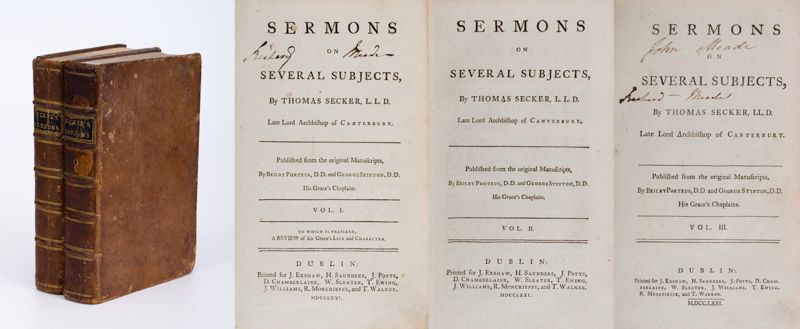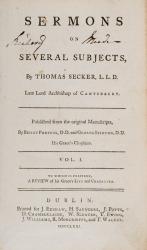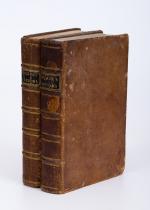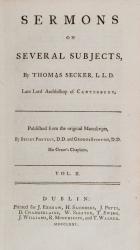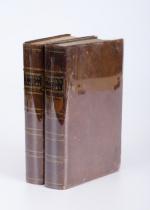Secker, Sermons on Several Subjects, by Thomas Secker, L.L.D. Late Lord Archbish
Sermons on Several Subjects, by Thomas Secker, L.L.D. Late Lord Archbishop of Catherbury. Published from the Original Manuscripts by Beilby Porteus, D.D. and George Stinton, D.D. His Grace Chaplains. To which is Prefixed “A Review of his Grace’s Life and Character”.
First Edition. Four Volumes bound in Two (complete set). Dublin, Printed for J.Exshaw, H.Saunders, J.Potts etc., 1771. Octavo. LXX, 416, IV, 495 pages. Original Hardcover / 18th-century full leather with spine-labels and ornament. Both Volumes in protective Collector’s Mylar. Very good condition with some signs of external wear. Titlepage of Volume III slightly detached. Some minor staining only. From the libraries of John and Richard Meade (Ballymartle), with their names in ink to titlepages.
Thomas Secker (21 September 1693 – 3 August 1768) was the Archbishop of Canterbury in the Church of England.
Secker was born in Sibthorpe, Nottinghamshire. In 1699, he went to Richard Brown’s free school in Chesterfield, Derbyshire, staying with his half-sister and her husband, Elizabeth and Richard Milnes. According to a story in the Gentleman’s Magazine for 1768, Brown congratulated Secker for his successful studies by remarking, “If thou wouldst but come over to the Church, I am sure thou wouldst be a bishop.” Under Brown’s teaching, Secker believed that he had attained a competency in Greek and Latin.
He attended Timothy Jollie’s dissenting academy at Attercliffe from 1708, but was frustrated by Jollie’s poor teaching, famously remarking that he lost his knowledge of languages and that ‘only the old Philosophy of the Schools was taught there: and that neither ably nor diligently. The morals also of many of the young Men were bad. I spent my time there idly & ill’. He left after one and a half years. In 1710, he moved to London, staying in the house of the father of John Bowes, who had been one of Jollie’s students and would one day become Lord Chancellor of Ireland. Whilst here, he studied geometry, conic sections, algebra, French, and John Locke’s Essay Concerning Human Understanding.
Also boarding at Bowes’s house was Isaac Watts, who encouraged Secker to attend the dissenting academy in Gloucester set up by Samuel Jones. There Secker recovered his ability at languages, supplementing his understanding of Greek and Latin with studies in Hebrew, Chaldee and Syriac. Jones’s course was also famous for his systems of Jewish antiquities and logic; maths was similarly studied to a higher than usual level.
Also at Jones’s academy contemporaneously with Secker were the later Church of England bishops Joseph Butler and Isaac Maddox and also John Bowes; other members included the future dissenting leaders Samuel Chandler, Jeremiah Jones and Vavasour Griffiths. In 1713, Jones moved his academy to larger premises in Tewkesbury, partly financed by £200 from Secker. But Secker soon became involved with the clandestine correspondence between Butler and a Church of England cleric, Samuel Clarke, concerning Clarke’s A Demonstration of the Being and Attributes of God (1705). Secker’s role was to deliver Butler’s letters personally to Gloucester post office and to pick up Clarke’s replies. Meanwhile, Jones had acquired a reputation as a heavy drinker and the standard of his teaching may have decreased. Both Butler and Secker left his academy shortly afterwards, Butler in February 1714 and Secker in June of the same year.
He studied medicine in London and Paris before receiving the degree of MD from Leiden University in 1721. Upon his return to England, he entered Exeter College, Oxford and was ordained, by special letters, in 1722 from the Chancellor of Oxford University.
In 1724 he became rector of Houghton-le-Spring, Durham, resigning in 1727 on his appointment to the rectory of Holy Cross Church, Ryton, County Durham, and to a canonry of Durham. He became rector of St James’s Westminster in 1733 and Bishop of Bristol in 1735. About this time George II commissioned him to arrange a reconciliation between the Prince of Wales and himself, but the attempt was unsuccessful.
In 1737 he became the Bishop of Oxford and then the Dean of St Paul’s Cathedral, London, in 1750. On 21 April 1758, a month after the death of his predecessor, he became Archbishop of Canterbury. His advocacy of an American episcopate, in connection with which he wrote the Answer to Jonathan Mayhew’s Observations on the Charter and Conduct of the Society for the Propagation of the Gospel in Foreign Parts (London 1764), raised considerable opposition in England and America. (Wikipedia)
- Keywords: 18th / 19th Century Country House Library of Richard Meade – Ballymartle · 18th Century · 18th Century – Rare · Catalogue No.7 – Religion · Irish History · Meade Library Ballymartle · Religion – Rare · Richard Meade Library (Ballymartle)
- Language: English
- Inventory Number: 29744AB
EUR 275,--
© 2025 Inanna Rare Books Ltd. | Powered by HESCOM-Software




